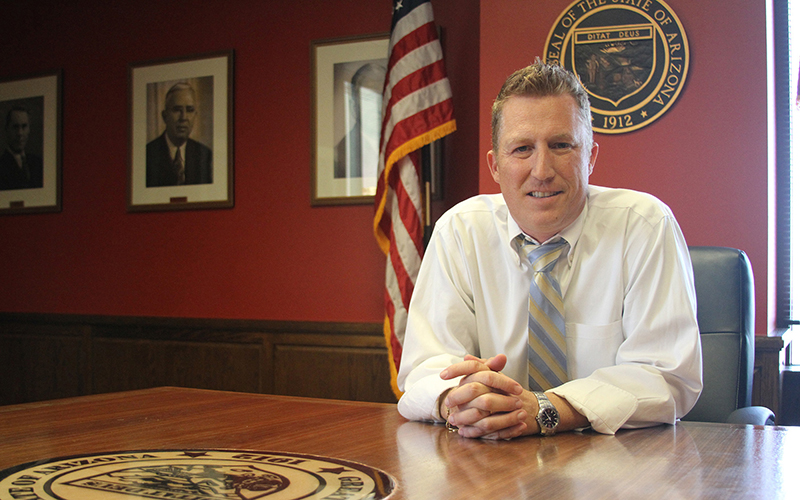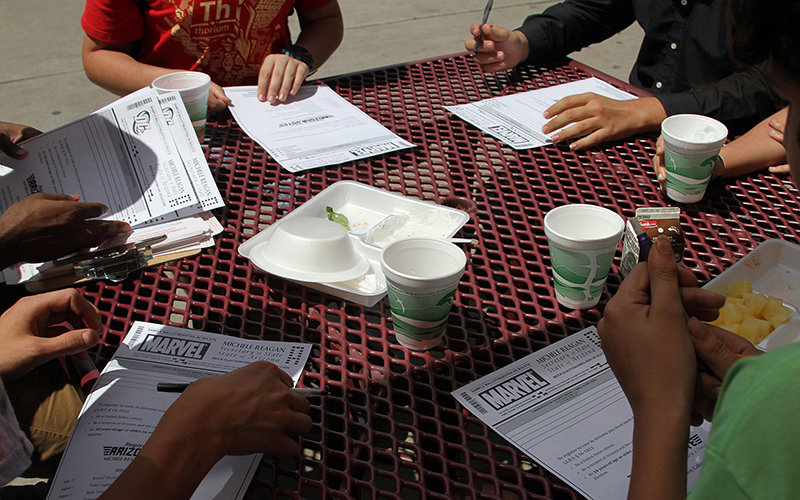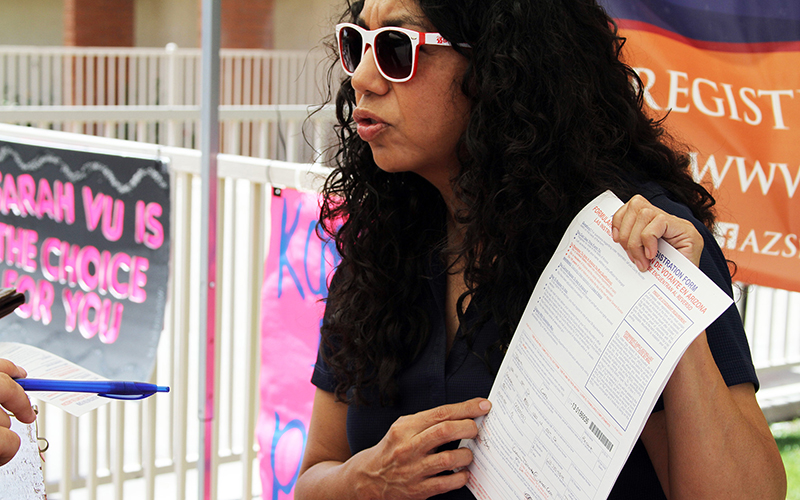- Slug: BC-CNS-Young Voters,1060
- Photos available (thumbnails, captions below)
By MARIANNA HAUGLIE
News21
At 12:08 p.m., two minutes before the start of the second lunch period at Ironwood High School in Glendale, Teresa Martinez sprang into action.
As she straightened stacks of sample ballots, located clipboards, and set out pens on the folding table set up outside the lunchroom, her partner, Darryl Bess, added a couple more fistfuls of mini lollipops and about a dozen bright-red bracelets stamped with the slogan, “MY VOICE MATTERS.”
When students began to trickle by the table, Martinez stepped out among them. “Are you guys registered to vote?” she asked. “Here’s a registration form. Everyone who registers to vote today gets this.” She held up a brilliant square of metallic cardstock framing the collectible 2008 Arizona State quarter. “Come cast a vote! Vote for your favorite superhero!”
The goal, said Martinez, who works for Arizona Secretary of State Michele Reagan, is to expose these students to the voting process, register as many eligible new voters as possible and create a level of comfort with the election process. Bess works for a youth outreach program that shares this mission.
Such mock voting events have been taking place around Arizona for a little more than a year. Before Reagan took office, the state’s new voter outreach program involved mailing thousands of postcards to Arizona residents on their 18th birthday.
“To send a random postcard to a person that says, ‘You’re gonna be 18; register to vote,’ I mean, I don’t know how impactful that is,” said Martinez. “I don’t know that we have the data to show the response from that. We don’t know.”
Still, “the postcards triggered everything else,” said Matt Roberts, director of communications at the Secretary of State’s Elections Office. Each month, Roberts said, the office mailed out around 3,000 postcards, costing more than $8,000 in 2015, the last year before the program was discontinued.
“(Reagan) decided that it was $8,000 better spent digitally,” said Roberts, who oversees Martinez and Joe Delgardo, Arizona’s two voting-rights ambassadors. Reagan created the two part-time ambassador positions by eliminating an elections staff position, with the goal of reaching as many new voters as possible. The ambassadors have registered hundreds of new voters and explained the importance – and mechanics – of voting to countless other citizens.
Since taking office, Reagan has focused on a variety of voter-outreach methods, including Facebook banner ads, live radio shows, youth events and partnerships with nonpartisan civic activist organizations. The ambassadors, however, are her most powerful tool in increasing the amount of registered voters.
“Before Secretary Reagan, the person who did this job … she would come up and she would say, ‘Don’t be disappointed if you only get three registrations at an event,’” recalled Martinez. “I said, are you kidding me? Three voter registrations? She’s like, ‘Nobody wants to vote. Nobody likes it. It’s all boring.’”
The voting-rights ambassadors’ job is to change this perception. Delgardo and Martinez travel the state holding mock elections at schools and universities, giving presentations and answering questions. They’ve visited middle schools, high schools, tribal reservations, Boys and Girls Clubs, community colleges, youth conferences, all three state universities, community festivals and other major events, including Country Thunder. Gov. Doug Ducey just approved funds to send them to the Phoenix Comic Con this summer. By partnering with various organizations that share their common goal, they are able to tap into a national network dedicated to grassroots voter outreach.
One such organization is Inspire Arizona, a local chapter of a larger national project that targets high school students who are not yet registered to vote. Bess, a program coordinator with Inspire, went to the Ironwood High School event to help Martinez with the organization’s “Pledge to Reg” cards stacked on the table among the candy, pamphlets, and sample ballots. Teens are encouraged to fill out these cards, which Inspire staff then enter into a database of youth throughout the nation.
“We contact the students when they’re old enough to register, and remind them about the issues that matter most to them,” said Bess, indicating spaces on the pledge cards where students can mark boxes for popular social issues or write in what they believe are the defining issues for their political motivation today. “Legally, we’re not allowed to text them, but we can email and call.”
Inspire selects students in local school groups to encourage their peers to become politically engaged. Roberts said the ambassadors’ program focuses on such partnerships with outreach organizations.
“Generally speaking, we want to develop and brainstorm ideas,” Roberts said. “We want to find new ways to communicate with younger age groups. We don’t have numbers goals – we don’t want to focus on metrics. We want to be creative instead. We don’t want to create a sense that we could fail.”
Each mock election uses real, full-size sample ballots, to familiarize new voters with how a ballot should look and feel. The ambassadors’ program even has its own electronic voting machine, repurposed for prospective voters to cast ballots on topics such as their favorite ice cream, best type of car and whether they should get more vacation days. The event at Ironwood High School gave teens the opportunity to vote for their favorite comic characters. Instead of political parties, characters were drawn from the Marvel or D.C. universes.
Sometimes the ambassadors bring ballots with the names of real political candidates on them, but they use non-politician stand-ins more often than not. Event coordinators, especially some more activist-minded partners, are uncomfortable bringing controversial topics into an outreach setting. Ultimately, they said, the lasting impression is the act of voting, not what was on the ballot.
“It’s a compelling, hands-on experience that we kind of hope inspires these kids … (that) their vote can count for something,” said Roberts. “We’re trying our darnedest.”
An outreach and mock election event last month in San Tan Valley took place at a particularly crucial time: the high school had recently lost a major bond election that would have funded a new gym. Teachers explained the situation to their classes before the voting rights ambassador team arrived – the measure had failed by 16 votes.
The community was up in arms over the lost election. Sixteen more votes, and San Tan High School could have had a new gym. For the students, the democratic process rapidly crystallized. Their voices suddenly mattered. 133 teens registered to vote that day.
Editor’s note: This story was produced for Cronkite News by the Walter Cronkite School-based Carnegie-Knight News21 “Voting Wars” national reporting project.
^__=
Matt Roberts oversees the Voting Rights Ambassadors program for Arizona Secretary of State Michele Reagan. (Photo by Marianna Hauglie/News21)
A group of high school students participate in a mock election event at Ironwood High School in Glendale in April. (Photo by Marianna Hauglie/News21)
Teresa Martinez, a voting-rights ambassador for the Arizona Secretary of State, explains a voter registration form to high school students at a mock election in April. (Photo by Marianna Hauglie/News21)


